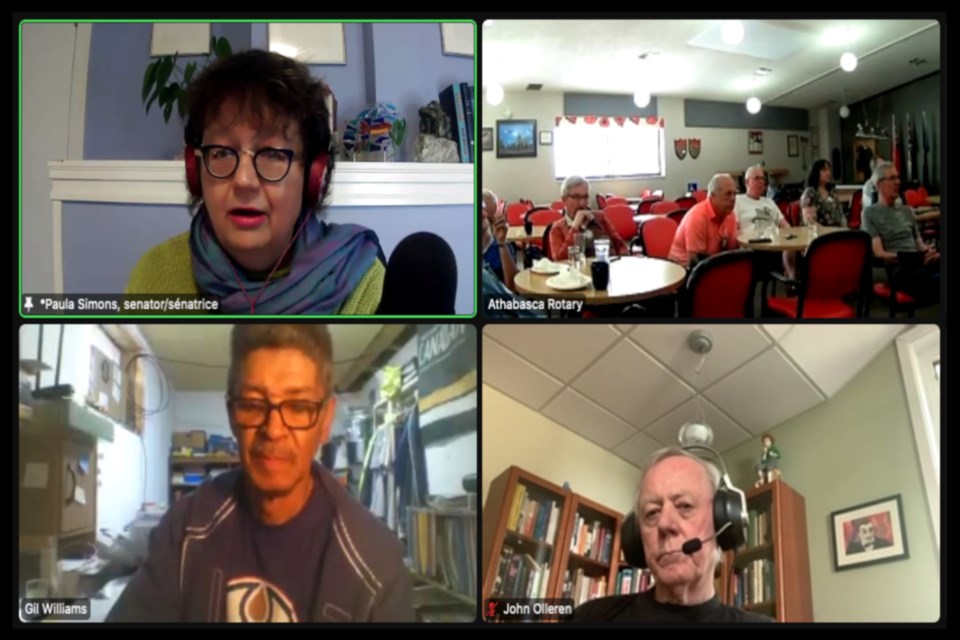ATHABASCA — Why does Alberta Senator Paula Simons make videos about her home province?
At the May 25 Athabasca Rotary Club meeting, the Alberta senator spoke via Zoom in a mixed format meeting, first playing her video Return to Amber Valley then speaking about her role as a senator before taking questions.
“I joined the Senate in October 2018, at a time when Alberta was in a deep fury with Ottawa,” she said. “It was the time of the yellow vest convoy. There was lots and lots of talk of separation and me, well, I was angry for a different reason. I was angry by what I saw as a hijacking of Alberta and Alberta’s story.”
A journalist herself, she said she was tired of the Toronto media always looking for “the angriest Alberta redneck to interview.”
“And I was tired of conservative right wingers from Ontario moving here and then magically claiming to speak for all Alberta and I was tired, so, so, tired of people telling me I wasn't a real Albertan because I didn't share the racist views of the yellow vesters or because I didn't think it was a good idea for a landlocked province reliant on trade to separate,” Simons said.
So, she started making videos for her YouTube channel highlighting the Alberta beyond the stereotypes.
“I wanted to share the province that I love so much with my Senate colleagues to give them a better understanding of the diverse, rich, complicated province we share.”
And one of those stories was about Amber Valley, and as it would happen, Amber Valley Historical Society president Gil Williams was also in attendance and able to give more information to Simons.
“Most of the Blacks who were in Amber Valley were from Oklahoma,” he said. “But there was movement in 1910 (to Amber Valley) but they also moved back (to) Tulsa, Oklahoma.”
Williams noted his own grandfather was from Mississippi, not Oklahoma, and he homesteaded in 1912 in the Paxson area of Athabasca County, south of Amber Valley.
“So, he was one generation from slavery,” Simons commented.
“That’s right, my grandmother was,” replied Williams. “Good observation.”
Simons noted it wasn’t just Black people being forced out, but Indigenous people as well.
“These days we call it ethnic cleansing,” she said. “And then the story of Effie Jones marrying a guy from the Punjab. They had kids and one of their daughters, Judy Singh, went on to be a very popular Jazz singer, sang with Tommy Banks and his orchestra and the CBC did a big thing on her a couple of months ago.”
Not all of the presentation focused on Amber Valley though, and Simons explained the process to become a Senator changed in 2015 under Prime Minister Justin Trudeau allowing anyone 30 years of age and up to apply with an essay of why they would be a good senator and letters of recommendation. A non-partisan committee then puts forward the chosen names which the PM then rubber stamps, regardless of political affiliation and in fact, now, out of 105 Senators, only 16 belong to any party.
“Because almost all the senators are independent, they're not whipped, they're not loyal to the Prime Minister or the leader of the opposition,” said Simons. “That means every Senator makes up his or her own mind about every piece of legislation. That makes us a somewhat more muscular body. We're much more likely than the old Senate to amend legislation and much more likely to push back against laws we don't like and much freer to defend our regions as I am free to defend Alberta.”
It was during the Bill C-69, the Environmental Assessment Act, debate Simons was appointed.
“Bill C-69 … which is a bill that when I arrived in the Senate, people were already angry about it,” said Simons. “It was pretty flawed, and we suggested more than 100 amendments to that act, and they accepted, I think, 99 of them, which was, I believe, the most amendments any government had ever accepted from any Senate to any bill.”
And it is not like the U.S. Senate where they can veto a proposed law from Congress.
“One of my more senior Senate colleagues said to me once, ‘We ping. We do not pong.’ So, they send us a bill, we ping it back, they send it back, and then usually we have to swallow hard and accept, but we don't have to,” she said. “We can go on if we want pinging the ball back to them, because no piece of legislation can be passed unless it has the support of the Senate. The challenge is that we can't just defeat a piece of legislation because we don't like it, because we think we could have done a better job drafting it. If we're gonna refute a piece of legislation, it has to be because we have a good faith belief that that bill is unconstitutional.”
Due to the mandatory retirement at age 75 from the Senate, Simons has about 18 years left, and she plans to keep promoting Alberta to her colleagues as well as Albertans, letting them know of all the hidden treasures and forgotten stories the province has to offer.
“I was appointed to the Senate just a few weeks after my 53rd birthday, and if I stay in good health, I can serve until I'm 75 but however long I'm there, I want to leave a legacy that I can be proud of and that makes you proud to have me represent you.”



